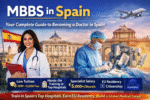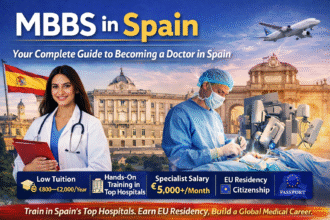Moving to Spain is an exciting adventure filled with opportunities, cultural experiences, and a fresh lifestyle. Whether you are relocating to Spain to study at a Spanish university, start a new career in Spain, or enjoy the benefits of the Spanish lifestyle, proper preparation is key to a smooth transition.
Planning your move to Spain in advance helps you avoid unnecessary stress, save money, and adjust quickly to life abroad. From gathering the right documents for your Spain visa application to understanding healthcare, housing, and banking, every step matters in making your relocation successful.
This guide will walk you through essential tips, practical steps, and insider advice on how to prepare before moving to Spain. While some recommendations are specific to Spain’s system, many apply to international moves worldwide—making it the perfect resource for anyone planning to live, work, or study abroad.
Sort Out Your Finances Before Moving to Spain
One of the most crucial steps when preparing to move to Spain is making sure your finances are in order. Many expats and international students face unnecessary stress because they overlook banking and payment issues. Here’s how you can avoid financial hassles during your relocation:
- Inform your bank: Let your bank know you’ll be living abroad. Otherwise, they may block your card for “suspicious activity” once transactions start coming from Spain.
- Check card validity: Ensure your debit and credit cards won’t expire while you are in Spain. Renew them in advance if needed.
- Open an international-friendly account: Consider digital banks and fintech apps like Revolut, Wise, or N26. These options provide better exchange rates, lower transaction fees, and easy international money transfers—perfect for expats in Spain.
- Bring some cash in euros: Carry at least €200–€300 in cash for immediate expenses such as airport transport, groceries, or your first few days of accommodation before setting up a local Spanish bank account.
💡 Tip: Once in Spain, you may also want to open a Spanish bank account to simplify bill payments, rent transfers, and salary deposits if you’re working.
Book Temporary Accommodation for Your Arrival in Spain
When you first arrive in Spain, having temporary accommodation arranged will make your transition much smoother. A safe and flexible place to stay allows you to settle in without the pressure of rushing into a long-term rental.
- Start with Airbnb or a short-term hotel: Secure accommodation for at least 1–2 weeks. This gives you time to adjust, complete paperwork, and explore rental options.
- Avoid rushing into contracts: Never sign a long-term lease without visiting the property in person. Unfortunately, rental scams in Spain are common. Always check the apartment, meet the landlord or agency, and sign the contract face-to-face.
- Explore different neighborhoods: Use this period to get familiar with local areas. Consider essential factors such as public transport connections, safety, grocery stores, and proximity to work or university. Each Spanish city has very different neighborhoods, so take the time to choose wisely.
💡 Tip: If you’re a student or professional, you may want to look into shared apartments (pisos compartidos) or student residences as budget-friendly housing options.
Prepare Essential Documents Before Moving to Spain
Dealing with Spanish bureaucracy can take time, so it’s smart to have all the necessary documents ready before you travel. Missing paperwork often delays important processes like getting your residence card, opening a bank account, or registering at the local town hall (empadronamiento).
Here are the key documents you should bring when relocating to Spain:
- Valid passport and visa/residence permit documents – Make multiple copies and keep both digital and paper versions.
- Birth certificate and marriage certificate (if applicable) – These are often required for family reunification, residence permits, or official registrations.
- Academic transcripts and diplomas – Essential if you are coming to study in Spain or apply for further education. Some documents may need to be apostilled or officially translated into Spanish.
- Health insurance policy – Proof of private or public health coverage is a requirement for most visa types and also needed for your stay.
- Extra passport-sized photos – Always useful for official paperwork such as your NIE (foreigner identification number), transport passes, or student ID cards.
💡 Pro Tips for Spain paperwork:
- Some documents may need to be legalized (apostilled) or translated into Spanish by a sworn translator before they are accepted by Spanish authorities. Check requirements early to avoid delays.
- Keep both physical and digital copies of everything. Storing scans in a cloud folder (Google Drive, Dropbox, OneDrive) can save you in case you lose the originals.
Take Care of Appointments Early in Spain
One of the biggest challenges when you move to Spain is dealing with the country’s famously slow bureaucracy. Many essential services require an appointment (cita previa), and waiting times can stretch for weeks—or even months. To avoid unnecessary delays, try to book appointments before your move or immediately upon arrival.
Key appointments to prioritize in Spain:
- Empadronamiento (registering your address): This is the first step for most administrative processes in Spain. The padrón certificate is required for everything from accessing public healthcare to enrolling children in school.
- Toma de huellas (fingerprinting for your residence card): After your visa approval, you’ll need an appointment to provide fingerprints and receive your TIE (Tarjeta de Identidad de Extranjero), the essential residence card for foreigners in Spain.
- Transport card appointment: In cities like Madrid and Barcelona, you may need to book an appointment to obtain your monthly transport pass, which offers big savings compared to single tickets.
💡 Tip: Booking early can save you months of waiting. Many newcomers to Spain find themselves “stuck” without healthcare access or unable to open a local bank account simply because they delayed scheduling these appointments.
Plan for Your First Week Essentials in Spain
The first few days after you move to Spain can feel overwhelming, especially while waiting to settle into long-term housing or complete administrative paperwork. Having a few essentials prepared will make your transition much smoother and reduce stress.
Here’s what to pack or buy for your first week in Spain:
- Travel-size toiletries: Carry shampoo, soap, toothpaste, and other basics so you don’t have to rush to the store immediately.
- Season-appropriate clothing: Pack a few changes of clothes suited to the time of year and region of Spain (summers can be very hot, while winters in northern Spain are much colder).
- Prescription medication: Bring enough supply for at least a month, along with the doctor’s prescription or documentation. This is especially important since some medications may not be readily available in Spain.
- Chargers and power adapters: Spain uses Type C/F outlets, 230V, so make sure to bring the right adapters for your devices.
- Snacks or easy-to-make food: After long flights and jet lag, you’ll appreciate having something simple to eat before you figure out grocery shopping.
💡 Tip: As soon as you arrive, locate the nearest grocery store, pharmacy, and medical clinic. Knowing where to go in case of an emergency gives peace of mind and helps you settle faster.
Research Healthcare Options in Spain
Healthcare is one of the most important things to plan when you move to Spain. The country is known for its excellent public healthcare system, but access depends on your visa type and residency status. Understanding your options will help you avoid unexpected costs.
- Students in Spain: Most international students are required to show proof of private health insurance as part of their visa application. Make sure your policy covers full medical care in Spain, not just emergencies.
- Workers and residents: Once registered with Spanish Social Security, you can apply for access to the public healthcare system. This provides free or low-cost healthcare, including doctor visits, hospital treatment, and prescriptions.
💡 Tip: Even if you qualify for public healthcare, many expats choose to keep a private insurance policy in Spain for faster access to specialists and shorter wait times.
Brush Up on Spanish Basics
While many Spaniards speak English, especially in major cities like Madrid and Barcelona, knowing some basic Spanish will make your transition much smoother. Simple language skills help with daily tasks, interactions, and navigating administrative processes.
- Learn common phrases: Focus on greetings, asking for directions, ordering food, and other everyday expressions.
- Download a translation app: Apps like Google Translate or DeepL can be lifesavers in emergencies or when dealing with official paperwork.
💡 Tip: Even a small effort to speak Spanish is appreciated by locals and can make your first weeks in Spain more enjoyable and less stressful.
Pack Smart, Not Heavy
When preparing to move to Spain, it’s important to pack efficiently. You don’t need your entire wardrobe—focus on essentials and items that are either expensive or hard to find locally. Smart packing saves space, reduces shipping costs, and makes your first days more manageable.
- Versatile clothing: Spain’s climate varies by region—hot summers in the south, colder winters in the north—so pack adaptable clothes suitable for different weather conditions.
- Comfortable shoes: Walking is often the easiest way to explore cities, so bring comfortable shoes for daily use.
- Important electronics: Don’t forget essentials like your laptop, phone, and camera. Include necessary chargers and adapters for Spanish outlets (Type C/F, 230V).
- Household goods: Avoid packing bulky items—most basics like kitchenware, bedding, and furniture are easily available at stores like IKEA, Carrefour, or Decathlon.
💡 Tip: Prioritize lightweight, multipurpose items and consider buying larger or region-specific goods after you arrive in Spain to save luggage space.
Learn About Spanish Culture and Lifestyle
Being mentally prepared for life in Spain is just as important as handling logistics. Understanding local customs, schedules, and social norms will help you integrate smoothly and avoid surprises.
- Daily schedules: Lunch in Spain typically happens between 2–3 PM, and dinner is often served late, around 9–10 PM.
- Shop hours: Many businesses close for siesta in the afternoon, usually from 2–5 PM, so plan errands accordingly.
- Social life: Spaniards are warm, social, and community-oriented. Expect long meals, lively conversations, and late-night gatherings, especially with friends and family.
💡 Tip: Embrace the local rhythm and lifestyle—it will enrich your experience and help you feel at home faster as an expat in Spain.
Stay Connected with a Spanish SIM Card
Getting a local SIM card in Spain or a mobile plan early on will make your life much easier. Consider starting with prepaid SIMs from providers like Movistar, Orange, or Vodafone. Once you have a Spanish bank account and your residence card (TIE), you can switch to a monthly contract for better rates and data plans. Staying connected helps with navigation, communication, and managing administrative tasks during your move.
Final Thoughts: Make Your Move to Spain Smooth and Stress-Free
Relocating to Spain is an exciting and rewarding experience, but proper preparation is key to a smooth transition. By:
- Sorting out your finances,
- Booking temporary accommodation,
- Preparing essential documents, and
- Scheduling necessary appointments
…you can avoid the most common pitfalls that new arrivals face.
Beyond the paperwork, embracing Spanish language, culture, and lifestyle will help you settle in quickly. Learn basic phrases, explore local neighborhoods, try regional foods, and adapt to Spain’s unique daily rhythm.
With careful planning and an open mind, your move to Spain can be the start of an exciting and fulfilling journey as an expat, student, or professional.
📧 Email: info@studyinspainguide.com
💬 WhatsApp: +34 641342001











